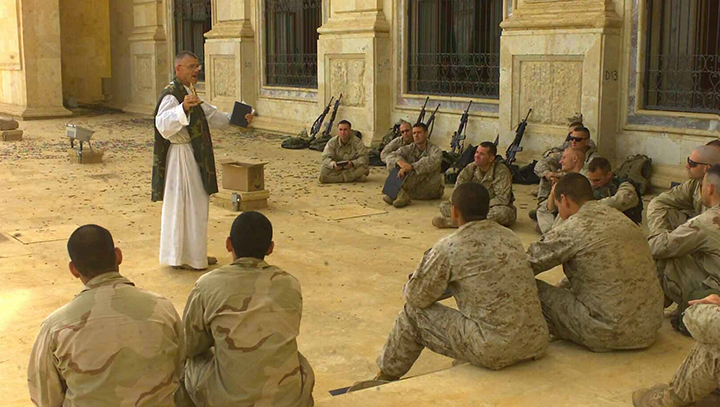
After receiving a letter of concern from his superiors for mentioning his Christian experience during a training class, Chaplain (CPT) Joe Lawhorn of the U.S. Army is now being supported by the Chaplain Alliance for Religious Liberty.
The alliance urges Lawhorn's commander, Colonel David Fivecoat, to retract the letter of concern from Lawhorn's file, urging him to reconsider his actions. "Chaplain Lawhorn should not be punished for simply being an excellent chaplain," said Chaplain (COL) Ron Crews, USA Retired, executive director of Chaplain Alliance for Religious Liberty.
"No chaplain should be threatened for doing exactly what a chaplain is supposed to do," he continued. "Chaplain Lawhorn's presentation was perfectly legal and protected by the Right of Conscience Clause passed by Congress in the 2013 National Defense Authorization Act."
The action that led to the reprimand involved a suicide prevention class that Chaplain Lawhorn was teaching for the 5th Ranger Training Battalion in Fort Benning, Georgia. During the session, Chaplain Lawhorn shared his own struggles with depression, citing Bible verses that helped him get through it. Lawhorn mentioned Israel's King David, using him as a powerful example for the class.
According to a statement, "At no time did he say his was the only way or even the preferred way of dealing with depression, and at no time did he deny the validity of any other method. In fact, Lawhorn made that clear during the session and provided the attendees with a list of other resources."
But when one student complained about the use of Biblical text for the class, Lawhorn's superiors stepped in to issue the letter of concern.
"You provided a two-sided handout that listed Army resources on one side and a biblical approach to handling depression on the other side," Col. David Fivecoat wrote in the letter to the chaplain. "This made it impossible for those in attendance to receive the resource information without also receiving the biblical information."
One main point that the commanding officer wanted to instill was that the chaplain was "careful to avoid any perception you are advocating one system of beliefs over another."
In addition to the Chaplain Alliance asking for the letter to be recinded, Mike Berry, the Director of Military Affairs is also urging the Army to reconsider its actions against the chaplain.
"It is outrageous that an Army chaplain would have his career threatened because he cared so much about his soldiers that he opened up to them about his personal struggles, and what worked for him," he said in a statement.
""That is the very definition of looking out for your soldiers," Berry continued. "And to be punished for it on Thanksgiving Day adds insult to injury. At a time when military suicides are increasing, one would assume the last thing the Army should do is punish a soldier who is trying to prevent them."
Georgia Congressman Doug Collins agreed. "I find it counterintuitive to have someone lead a suicide prevention course but prohibit them from providing their personal testimony," he said in a letter to Col. Fivecoat.
"Chaplains bare their souls for their soldiers to help them with crises they may be going through. That's what chaplains do," Crews added. "Chaplain Lawhorn should be commended not condemned."















